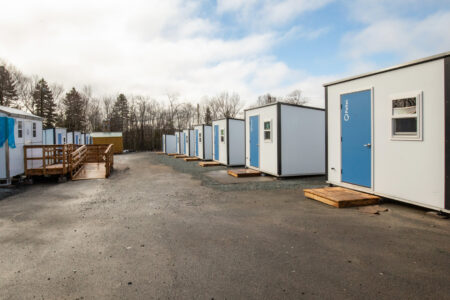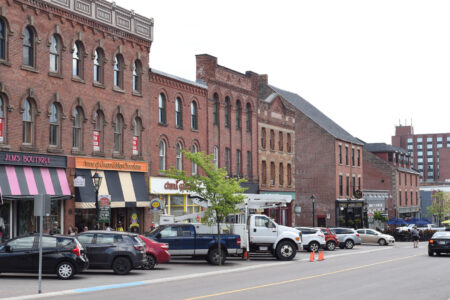
The implementation of emergency lockdown measures at the beginning of the pandemic in March 2020 left governments scrambling to meet the basic needs of millions of people. In the wake of considerable disruption and financial losses, the non-profit sector proved to be composed of resilient frontline organizations that stepped in to provide effective and meaningful policy delivery. Given their importance during the pandemic, ensuring that these types of non-profit community organizations can continue to operate should be a key focus of governments at all levels.
As COVID-19 first began to push the health-care system to the brink of capacity, “loneliness, hopelessness, despair, and death anxiety” started to become dangerously regular feelings for many who were dealing with some form of lockdown. As the pandemic raged on, health-care data revealed that racialized populations were at a disproportionally heightened risk of infection and mortality due to disadvantageous social determinants of health (SDH), such as employment, housing, income and education. This is consistent worldwide, where racialized populations have consistently been shown to have poorer health outcomes.
At the same time, in addition to containing and controlling a deadly health-care crisis that was particularly harmful to racialized communities, governments faced another challenge. In late May 2020, the murder of George Floyd sparked international protests against police brutality and racism, leading to renewed popularization of the Black Lives Matter (BLM) movement in mainstream discourse. Governments at all levels were then called upon to address the rise in anti-Black racism and systemic discrimination.
Responses from North American political leaders were inadequate, ranging from the violent and hostile rhetoric of then-president Donald Trump to Premier Doug Ford’s dismissiveness to Prime Minister Justin Trudeau’s performative protest appearance.
At the same time, race-based data in the U.S. began to show that the pandemic disproportionately affected racialized communities. In response to the lack of concrete actions taken by governments to address startling COVID-19 inequities and demands for racial justice, community advocacy groups and non-profit organizations jumped into action to support in whatever ways they could. While leaders in the sector knew they had to act, their resources were limited.
In April 2020, a comprehensive report released by the Ontario Nonprofit Network (ONN) revealed that 75 per cent of these organizations experienced reduced revenue from fundraising. In addition, 20 per cent were considering or had to close their operations (either permanently or temporarily) because of the pandemic.
The ONN, alongside the CEOs of major non-profits such as the Heart and Stroke Foundation of Canada, called on the Ontario government to establish a $680 million stabilization fund to revitalize and support the sector in the province. The Ontario Trillium Foundation responded with $83 million – only about 12 per cent of the ask. This left many organizations vulnerable and unable to address client needs.
Despite these challenges, members of the Ontario non-profit community recognized the effects of the pandemic on racialized populations and low-income neighbourhoods and mobilized to support these groups. These efforts were pursued despite a “financial crunch” amid significant demand to provide more programs and services, especially in Peel Region, west of Toronto.
The Functionary: Kathryn May’s newsletter on the public service
Several advocacy movements were spearheaded by community leaders and non-profit organizations in Peel Region. Activists, allies and members of underrepresented groups urged their elected representatives to take swift and decisive action. These were underscored by the fact that the region is one of the most diverse areas in Canada.
In 2016, Peel had the highest percentage of visible minorities within the Greater Toronto Area (GTA) at 62.3 per cent. Brampton and Mississauga, cities within Peel Region, also reflected this trend, with 73.3 per cent and 57.2 per cent of their populations respectively identifying as a visible minority. During the pandemic, Brampton also had one of the highest rates of COVID-19 in Ontario. In one of its neighborhoods, nearly one in five tests were positive – five times the provincial average.
As calls for action continued to grow, advocacy movements became more centralized and focused. The Anti-Black Racism and Systemic Discrimination (ABR-SD) Collective of Peel is a prominent advocacy group with goals to dismantle racism and systemic discrimination. To date, the collective has received funding and seen the implementation of equitable, diverse and inclusive initiatives in the policy approaches of the Region of Peel; Trillium Health Partners; the Dufferin-Peel Catholic District School Board; the Peel District School Board, the Ontario Ministry of Health and Long-Term Care; and other stakeholders.
Community leaders in the ABR-SD Collective were also able to successfully lobby the provincial and local governments to collect race-based data on COVID-19 testing rates. They oversaw the community development and implementation of a $29 million province-wide investment in the Community Health Ambassador program, which provided culturally specific outreach, education and support to marginalized communities during the third wave of the pandemic. In addition, the Region of Peel has given funding to the collective to support and continue its advocacy initiatives.
How can governments support policy endeavours similar to those undertaken by non-profit organizations? Three key considerations aimed at both government and those in the non-profit sectors could help create more certainty for these groups, making it easier for them to fulfil their mandates.
1. Government should support non-profits in building advocacy skills. As political scientist Karine Levasseur and Allan Northcott, president of the Max Bell Foundation, point out, the sector lacks policy capacity and advocacy. To support non-profits in their advocacy process, organizations such as the ONN should receive additional funding and resources to encourage collaborative partnerships to unify and develop their advocacy efforts.
2. Government needs to recognize the role non-profits play in shared program delivery at the local level. Because of their unique perspective, these organizations should be welcomed by all levels of government. Public policy recommendations from non-profits should be encouraged. Collaborative partnerships among these groups should be formed and governments could fully recognize the significance of shared program delivery and policy co-design efforts – especially amongst marginalized and disadvantaged populations.
3. Non-profits should recognize the tone and rhetoric of elected officials. This would help in responding to deeply sensitive societal issues and influence the (lack of) concrete policy solutions at hand. For effective advocacy to occur, non-profits must understand the political sensitivities of particular policy issues to better develop and frame their advocacy recommendations, which should strengthen their efforts to support the groups they represent.
As governments continue to face increased pressure to enact health-care reform, the pandemic has not only amplified the weaknesses underlying Canada’s health-care system, but also has brought attention to the disproportionate effect that these fragmented institutions have on the most vulnerable and disadvantaged members of society. Government implementation of swift policy actions to support non-profits – coupled with increased scrutiny of the responses from our elected officials – would help these groups fully mobilize to achieve equitable and inclusive public policy outcomes.







